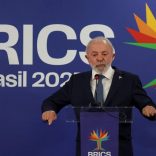Workers at Brazil's Embraer begin indefinite strike
Timor-Leste’s independence today would be “very difficult,” says former journalist

File photo: Lusa
Former journalist Mário Robalo, who in 1991 managed to interview Xanana Gusmão while underground, believes that independence for Timor-Leste would currently be very difficult or even impossible.
In the Summer of 1991, while the former Portuguese colony was still under Indonesian occupation, the former reporter for the weekly newspaper Expresso obtained permission from Jakarta to visit the territory through then-ambassador Francisco Lopes da Cruz, an advisor to dictator Suharto.
“Today, independence would not have been possible given the unfortunate current global scenarios,” said Mário Robalo during an interview.
Residing in the Viana do Castelo area, Robalo reminisced about the 1999 referendum, when the population voted in favor of establishing a sovereign state in the eastern part of the island. This took place under the administration of US President Bill Clinton, at a time when human rights issues were prominent on the United Nations’ agenda.
In Portugal, António Guterres, the current Secretary-General of the United Nations, was the Prime Minister, while Jaime Gama served as the Minister of Foreign Affairs.
On the Timorese side, José Ramos-Horta, now the President of the Republic, held global diplomatic responsibilities as a representative of FRETILIN and the resistance leader Xanana Gusmão, engaging with international bodies such as the UN.
“They had the ability to engage with the Clinton Administration due to their democratic interest,” Mário Robalo noted regarding the Portuguese government and the National Council of Timorese Resistance.
In the final years of the 20th century, there existed within the United Nations and globally “a new understanding of human rights,” and the persistent violations in the former colony were a matter of concern for Democrat Bill Clinton, Robalo opined.
“The Suharto regime endured with support from American armaments. This influenced the relationship dynamics between the US and Jakarta, as well as with Lisbon,” emphasized the former journalist, who was around 40 years old when he interviewed Xanana in 1991.
Constitutionally, Portugal was committed to completing the decolonization of the territory and remained recognized by the UN as its administrative power.
Both the Timorese resistance and the government of António Guterres “skilfully managed this political strategy,” said Robalo, who, in 1991, was detained and interrogated for several days by Indonesian military forces in Dili after meeting Xanana.
“Portugal astutely utilized that Clinton era, which was pivotal,” he stressed.
The establishment of INTERFET, “a UN force to intervene in Timor in 1999 if violence ensued post-referendum, was deliberated, decided, and voted on overnight,” a process deemed “impossible in today’s context.”
The former journalist acknowledged that in the early years of Indonesian military occupation, begun on December 7, 1975, with a death toll in the thousands, FRETILIN’s presence in Portugal “wasn’t well-received” institutionally.
For instance, the exiles of the Revolutionary Front for an Independent East Timor, which had unilaterally declared independence on November 28, 1975, operated from a modest space provided by the People’s Democratic Union (UDP) at their national headquarters in Lisbon.
“They faced significant initial challenges,” affirmed Robalo.
Mário Robalo shared his insights as part of a discussion on his article “East Timor: A Difficult Struggle for Freedom,” written for the latest edition of the magazine “Ipsis Verbis.” This edition, celebrating the 50th anniversary of the April 25 revolution, was coordinated by Luís Filipe Torgal and Basílio Torres and released by the Oliveira do Hospital School Group last week.













Leave a Reply
Be the First to Comment!
You must be logged in to post a comment.
You must be logged in to post a comment.